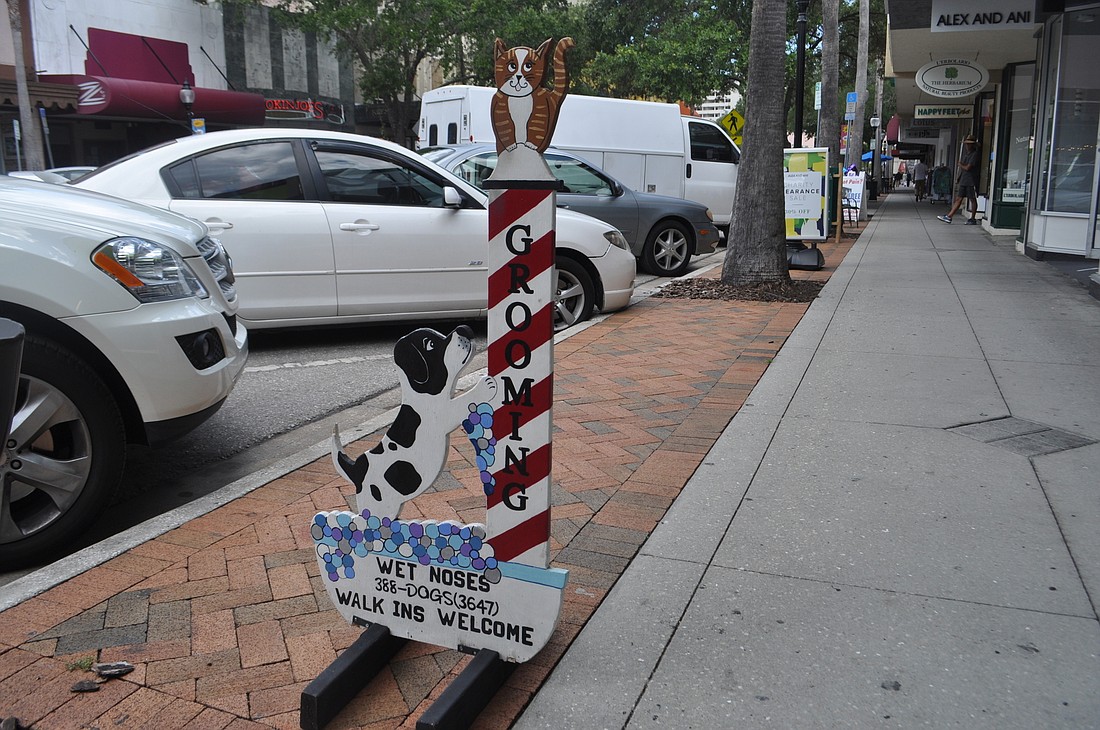- December 15, 2024
-
-
Loading

Loading

City Attorney Robert Fournier has spent months crafting new regulations regarding the posting of signs in the public right of way.
He was tasked with threading a needle. Officials want to let downtown merchants place signs advertising their businesses along the sidewalk, but the city prohibited the practice in 2014.
The decision was a response to a conflict between merchants and legal consultant Michael Barfield, who posted signs insulting downtown businesses to protest the city’s previous sign regulations.
The City Commission has expressed an interest in a policy that would avoid further issues but allow merchants to post signs.
Fournier believes the new regulations, approved Monday, can achieve that goal. Maybe.
“It’s hard to say going into it how it could work out,” Fournier said. “Quite honestly, I think it could go either way. There’s only one way to find out.”
"Quite honestly, I think it could go either way. There’s only one way to find out." — Robert Fournier
Fournier says the challenge the city is facing is not common in other municipalities. Typically, a policy allowing merchants to post signs in front of their stores is unlikely to go challenged. Barfield’s signs went up after some merchants posted their own signs discouraging panhandling.
The city’s Urban Design Studio has proposed a system in which businesses would be entitled to one sign in an “amenity zone” in front of their building. Considering the free speech entitlements in the public right of way, Fournier said the city had to allow all signs if it was going to allow any.
“That is the area where the public is given the broadest possible latitude for the expression of First Amendment,” he said.
For now, the city is testing its new policy with a six-month pilot program. To avoid complications, only one sign is allowed per person or business entity.
Signs are only allowed in the Downtown Core and Downtown Bayfront zoning districts. They must be posted no earlier than sunrise and removed by 10 p.m.
Businesses have until Tuesday to obtain a permit before the new regulations go into effect. The program got an endorsement from Ron Soto, president of the Sarasota Downtown Merchants Association and a central figure in the dispute with Barfield.
Without the ability to regulate message or location, commissioners worried the regulations could lead to new problems.
“I’m just thinking about complaints a prospective business owner might raise,” Eddie said. “There’s a sign in front of their business they didn’t authorize that has a message contrary to what their message is.”
"I choose not to give advance notice of when I might exercise my rights." — Michael Barfield
For his part, Barfield thinks the intent is a step in the right direction, though he’s skeptical all messages will be treated equally.
“To the extent that the new policy allows a First Amendment free-for-all, I think that’s a good thing,” Barfield said. “The devil, I think, will be in the details of enforcement.”
He said he was “always going to exercise his First Amendment rights,” but demurred when asked if he would post his own sign.
“Along with the robust exercise of my rights, I choose not to give advance notice of when I might exercise my rights,” Barfield said.
He added that he didn’t see his dispute with merchants ending any time soon. Fournier said the city would keep an active watch for any problems — a task he doubted any other city attorneys had to deal with.
“I’d venture we’re the only place,” Fournier said. “Here, sometimes, we go down a different path.”